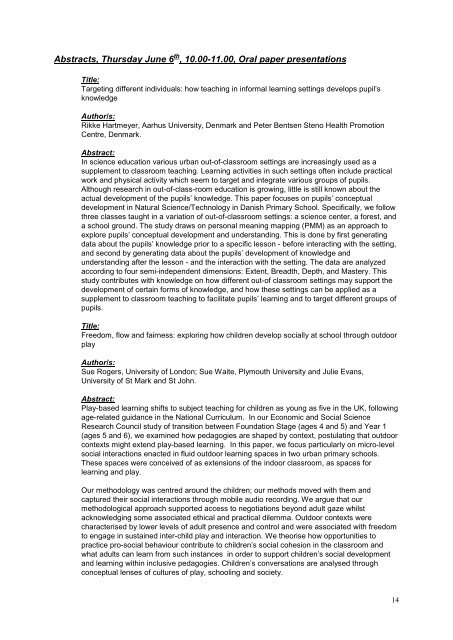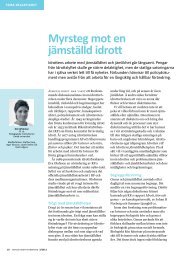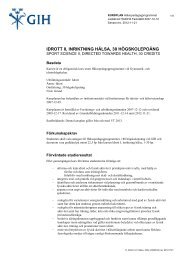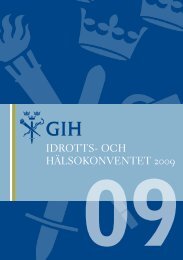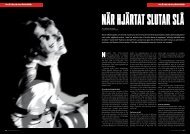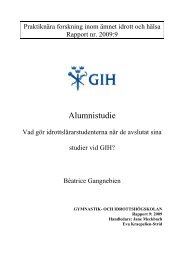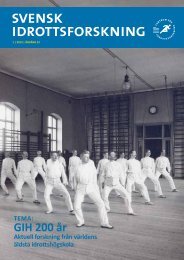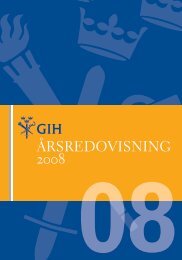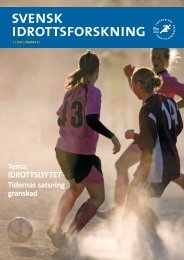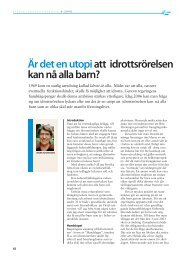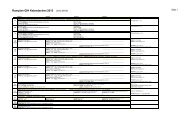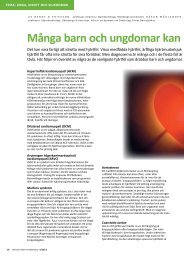Programme and abstracts - GIH
Programme and abstracts - GIH
Programme and abstracts - GIH
Create successful ePaper yourself
Turn your PDF publications into a flip-book with our unique Google optimized e-Paper software.
Abstracts, Thursday June 6 th , 10.00-11.00, Oral paper presentationsTitle:Targeting different individuals: how teaching in informal learning settings develops pupil’sknowledgeAuthor/s:Rikke Hartmeyer, Aarhus University, Denmark <strong>and</strong> Peter Bentsen Steno Health PromotionCentre, Denmark.Abstract:In science education various urban out-of-classroom settings are increasingly used as asupplement to classroom teaching. Learning activities in such settings often include practicalwork <strong>and</strong> physical activity which seem to target <strong>and</strong> integrate various groups of pupils.Although research in out-of-class-room education is growing, little is still known about theactual development of the pupils’ knowledge. This paper focuses on pupils’ conceptualdevelopment in Natural Science/Technology in Danish Primary School. Specifically, we followthree classes taught in a variation of out-of-classroom settings: a science center, a forest, <strong>and</strong>a school ground. The study draws on personal meaning mapping (PMM) as an approach toexplore pupils’ conceptual development <strong>and</strong> underst<strong>and</strong>ing. This is done by first generatingdata about the pupils’ knowledge prior to a specific lesson - before interacting with the setting,<strong>and</strong> second by generating data about the pupils’ development of knowledge <strong>and</strong>underst<strong>and</strong>ing after the lesson - <strong>and</strong> the interaction with the setting. The data are analyzedaccording to four semi-independent dimensions: Extent, Breadth, Depth, <strong>and</strong> Mastery. Thisstudy contributes with knowledge on how different out-of classroom settings may support thedevelopment of certain forms of knowledge, <strong>and</strong> how these settings can be applied as asupplement to classroom teaching to facilitate pupils’ learning <strong>and</strong> to target different groups ofpupils.Title:Freedom, flow <strong>and</strong> fairness: exploring how children develop socially at school through outdoorplayAuthor/s:Sue Rogers, University of London; Sue Waite, Plymouth University <strong>and</strong> Julie Evans,University of St Mark <strong>and</strong> St John.Abstract:Play-based learning shifts to subject teaching for children as young as five in the UK, followingage-related guidance in the National Curriculum. In our Economic <strong>and</strong> Social ScienceResearch Council study of transition between Foundation Stage (ages 4 <strong>and</strong> 5) <strong>and</strong> Year 1(ages 5 <strong>and</strong> 6), we examined how pedagogies are shaped by context, postulating that outdoorcontexts might extend play-based learning. In this paper, we focus particularly on micro-levelsocial interactions enacted in fluid outdoor learning spaces in two urban primary schools.These spaces were conceived of as extensions of the indoor classroom, as spaces forlearning <strong>and</strong> play.Our methodology was centred around the children; our methods moved with them <strong>and</strong>captured their social interactions through mobile audio recording. We argue that ourmethodological approach supported access to negotiations beyond adult gaze whilstacknowledging some associated ethical <strong>and</strong> practical dilemma. Outdoor contexts werecharacterised by lower levels of adult presence <strong>and</strong> control <strong>and</strong> were associated with freedomto engage in sustained inter-child play <strong>and</strong> interaction. We theorise how opportunities topractice pro-social behaviour contribute to children’s social cohesion in the classroom <strong>and</strong>what adults can learn from such instances in order to support children’s social development<strong>and</strong> learning within inclusive pedagogies. Children’s conversations are analysed throughconceptual lenses of cultures of play, schooling <strong>and</strong> society.14


